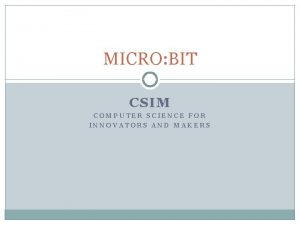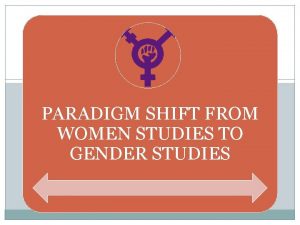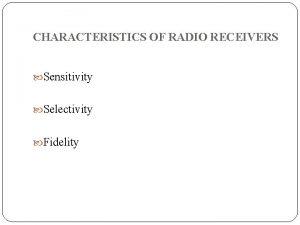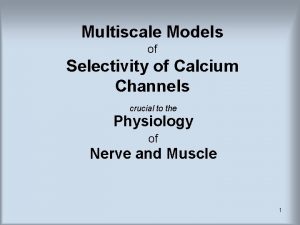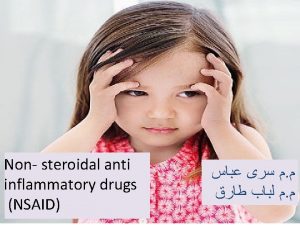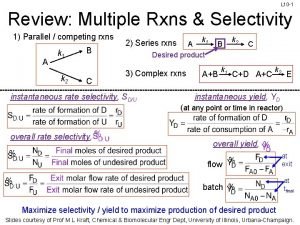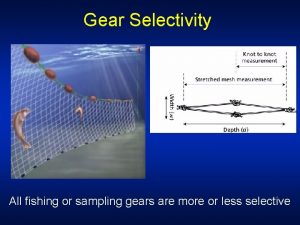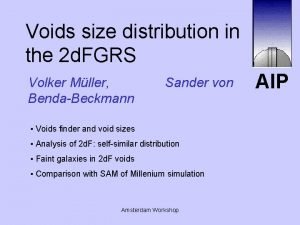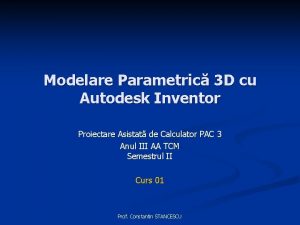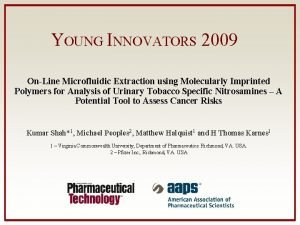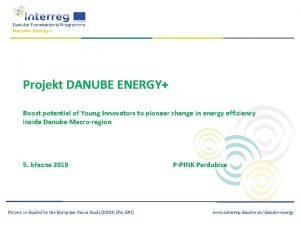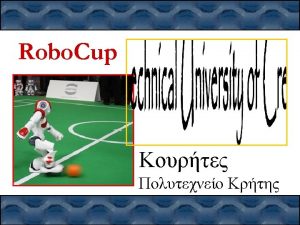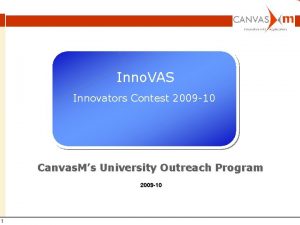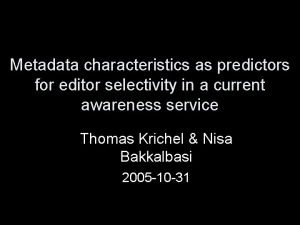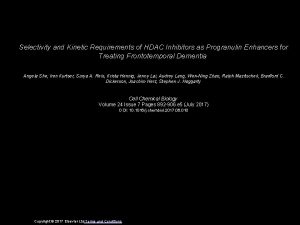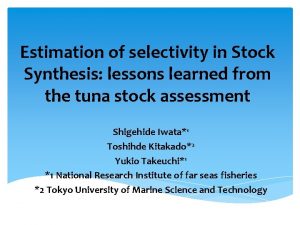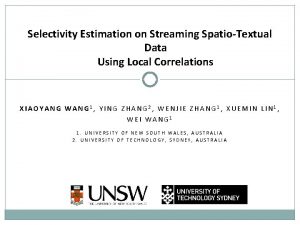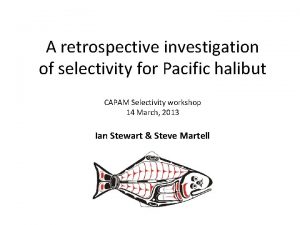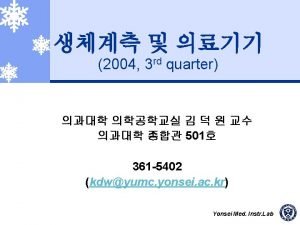YOUNG INNOVATORS 2009 Selectivity Studies of PI 3




























- Slides: 28

YOUNG INNOVATORS 2009 Selectivity Studies of PI 3 K Inhibitors by Molecular Docking Dima Sabbah University of Nebraska Medical Center College of Pharmacy

ABSTRACT • The PI 3 Kα isoform mediates PDGF and EGF-induced mitogenic responses, and is an attractive target for anticancer drug therapy. • Limited compounds have been reported as potent and selective inhibitors. • The absence of any experimental PI 3 Kα/ ligand 3 D structure hinders the rational development of new potent and selective drugs. Young Innovators 2009

ABSTRACT • The PI 3 Kγ isoform is important for immune system function. • Selective PI 3 K inhibitors would target PI 3 Kα to inhibit the tumor growth while spare the damage of the immune system. • Gain-of-function mutations have been observed in 32% of colon cancer, 27% brain cancer, 25% gastric cancer and 8% breast cancer. • Hot-spot mutants: H 1047 R, E 545 K, and R 88 Q. Young Innovators 2009

INTRODUCTION • The phosphatidylinositol 3 -Kinases (PI 3 K) are lipid kinases that phosphorylate phosphoinositide at the D 3 position of the inositol ring; the 3 -hydroxyl position of phosphoinositides (PIs). PIP 2 PIP 3 Vanhaesebroeck et al. Exp. Cell Res. 1999, 253, 239 -254. Young Innovators 2009

INTRODUCTION Pan PI 3 K inhibitors; non selective inhibitors of PI 3 Kα and PI 3 Kγ. Young Innovators 2009

INTRODUCTION Hayakawa et al. Bioorg. Med. Chem. 2007, 15, 5837 -5844. Alpha selective inhibitors Young Innovators 2009

INTRODUCTION Secondary structure of PI 3 Kγ(PDB code: 2 E 7 U). Snapshot captured using PYMOL. Young Innovators 2009

INTRODUCTION • We Hypothesized that : • The kinase domain of PI 3 Kα might be the ligand binding domain and could be a target for drug design. Kinase domain of PI 3 Kα. Picture made by PYMOL. Young Innovators 2009

MATERIALS AND METHODS • Homology Modeling. • Mutation of hot spot residues in PI 3 Kα. • Docking Study against (PI 3 Kα native and mutated) in addition to PI 3 Kγ. Young Innovators 2009

MATERIALS AND METHODS • I. II. Homology Modeling of PI 3 Kα and PI 3 Kγ. Fixing of the missing residues of PI 3 Kα and PI 3 Kγ using MOE. Alignment of PI 3 Kγ (template) with its ligand to PI 3 Kα using Dalilite Pairwise comparison of protein structure. Young Innovators 2009

MATERIALS AND METHODS • Mutation of residues using Mutate module in Maestro. • Docking of prospective hits in the receptor using Maestro. i. Glide receptor generation. ii. Ligand docking. Young Innovators 2009

RESULTS Secondary structure of PI 3 Kα before and after treatment. Picture captured using PYMOL. Young Innovators 2009

RESULTS Compound’s name PI 3 Kα native H 1047 R R 88 Q E 545 K PI 3 Kγ ORGLET 06_ Cpd 24 -10. 33 -9. 79 -9. 06 -9. 39 -6. 71 MOLCELL 00_Cpd 30 Staurosporine -10. 31 -12. 03 -10. 17 -10. 39 NA BMC 07_Cpd 6 -9. 74 -9. 11 -9. 72 -7. 08 -6. 25 BMC 07_Cpd 10 -9. 52 -7. 41 -7. 42 -7. 75 -4. 84 JAFC 07_Cpd 25 -8. 80 -9. 72 -9. 16 -9. 17 NA BMC 07_Cpd 16 -8. 33 -8. 89 -9. 32 -7. 67 -5. 50 BMC 07_Cpd 12 -9. 00 -7. 63 -9. 29 -7. 36 -2. 51 Docking scores of PI 3 Kα (native and mutated ) and PI 3 Kγ. Young Innovators 2009

RESULTS Compound’s name PI 3 Kα native H 1047 R R 88 Q E 545 K PI 3 Kγ ABB 08_Cpd 23 -7. 85 -8. 99 -9. 11 -7. 73 -9. 56 MOLCELL 00_Cpd 28 Quecetin -9. 65 -9. 96 -9. 54 -9. 47 -13. 84 BMC 07_Cpd 18_LY 294 002 -7. 81 -7. 47 -8. 84 -8. 75 -11. 50 MOLCELL 00_Cpd 29 Myricetin -9. 21 -8. 90 -8. 78 -10. 23 -14. 38 ABB 08_Cpd 21 -6. 39 -6. 22 -9. 77 -10. 22 -9. 16 Docking scores of PI 3 Kα (native and mutated ) and PI 3 Kγ. Young Innovators 2009

RESULTS Name PI 3 Kα R 88 Q H 1047 R E 545 K BMC 07_8 c ASP 933 No LYS 802 VAL 851, LYS 802 BMC 07_8 d ASP 933 VAL 851, LYS 802 VAL 851 BMC 07_8 i VAL 851, GLN 859 LYS 802 VAL 851, GLN 859 NO BMC 07_8 H VAL 851, GLN 859 LYS 802 VAL 851 BMC 07_15 VAL 851, LYS 802 VAL 851 GLN 859, LYS 802 Active binding residues of PI 3 Kα (native and mutated ). Young Innovators 2009

RESULTS Name PI 3 Kγ MOLCELL_00_Quercetin LYS 833, ASP 841, TYR 867, Val 882 MOLCELL_00_Myrecetin LYS 833, ASP 841, TYR 867, Val 882 ABB_08_Cpd 22 LYS 833, Val 882 ABB_08_Cpd 23 LYS 833 Active binding residues of PI 3 Kγ. Young Innovators 2009

RESULTS Active binding site of native PI 3 Kα; showing H bond in yellow dotted line. Young Innovators 2009

DISCUSSION • Four sections were filled up: section one with 18 missing residues [Tyr 307 -Thr 324]; section two with 9 missing residues [Ala 415 -Ala 423]; section three with 22 missing residues [ Phe 506 -Asp 527] and section four with 10 missing residues [Lys 941 -Glu 950]. • Docking studies exploited the active binding residues of PI 3 Kα and PI 3 Kγ. • Evaluation of docking results was based on the scores value ; the more the negative, the more favored binding, and also based on their tendency to form hydrogen bonds with the backbone of active residues. Young Innovators 2009

DISCUSSION • Pharmacophore models were generated based on a series of active PI 3 Kα inhibitors using the MOE program. • Conformational search of these inhibitors was carried out with imidazo [1, 2 -a] pyridine derivatives. • Alignment of global minima to the most active compound was accomplished using the superpose module for conserved functional group. Pharmacophore query editor. Young Innovators 2009

DISCUSSION • • The pharmacophore search was recruited using National Cancer Institute database containing 148276 number ligands. The huge NCI database was filtered depending on Lipinski's rule of five: i. Not more than five hydrogen bond donor (N or O with one or more H atoms). ii. Not more than 10 H bond acceptors (N or O atoms). iii. A molecular weight under 500 gm/mole. iv. Log P (Partition Coefficient) less than 5. Young Innovators 2009

DISCUSSION Structures and docking scores of hit molecules and reported inhibitors. Young Innovators 2009

CONCLUSION • The pharmacophore model suggests the aromatic rings and the hydrogen bond acceptors as the essential functional groups for active PIK 3 A inhibitors. • The docking model has quite successfully generated the experimental data. • Our results suggest residues Asp 933, Val 851, Lys 802, Gln 859 are critical for ligand binding to the native PI 3 Kα. • Residues Val 851, Lys 802, Gln 859 play more important roles in ligand binding to the hot-spot mutants. • Interactions with Lys 833, Val 882, Asp 841, Tyr 867 may reduce the selectivity of ligands. Young Innovators 2009

ACKNOWLEDGMENTS • University of Nebraska Medical Center o College of Pharmacy / Pharmaceutical department o Dr. Jonathan Vennerstrom • University of Nebraska Omaha o Department of Chemistry o Dr. Haizhen Zhong Young Innovators 2009

REFERENCES • • • Fry, M. J. , Waterfield, M. D. Structure and function of phosphatidylinositol 3 -kinase: A potent second messenger system involved in growth control. Philos Trans R. Soc Lond J Biol Sci 340, 337 -344, 1993. Vanhaesebroeck, B. , Stein, R. C. , Waterfield, M. D. The study of phosphoinositide 3 -kinase function. Cancer Surv 27, 249 -270, 1996. Vanhaesebroeck, B. , Waterfield, M. D. Signaling by distinct classes of phosphoinositide 3 -kinases. Exp Cell Res 253, 239 -254, 1999. Young Innovators 2009

REFERENCES • • Leevers, S. J. , Vanhaesebroeck, B. , Waterfield, M. D. Signaling through phosphoinositide 3 -kinases: The lipids take centre stage. Curr Opin Cell Biol 11, 219 -225, 1999. Vanhaesebroeck, B. , Leevers, S. J. , Panayotou, G. , Waterfield, M. D. Phosphoinositide 3 -kinases: A conserved family of signal transducers. Trends Biochem Sci 22, 267 -272, 1997. Cantley, L. C. The phosphoinositide 3 -kinase pathway. Science 296, 1655 -1657, 2002. Frederick, R. , Denny, W. A. Phosphoinositide-3 -kinases (PI 3 Ks): combined comparative modeling and 3 D-QSAR to rationalize the inhibition of p 110 α. J Chem Inf Model 48, 629 -638, 2008. Young Innovators 2009

REFERENCES • • Walker, E. H. , Perisic, O. , Ried, C. , Stephens, L. , Williams, R. L. Structural insights into phosphoinositide 3 -kinase catalysis and signaling. Nature 402, 313 -320, 1999. Walker, E. H. , Pacold, M. E. , Perisic, O. , Stephens, L. , Hawkins, P. T. , Wymann, M. P. , W illiams, R. L. Structure determinants of phosphoinositide 3 -kinase inhibition by wortmannin, LY 294002, quercetin, myricetin and staurosporine. Mol Cell 6, 909919, 2000. Knight, Z. A. , Gonzalez, B. , Feldman, M. E. , Zunder, E. R. , Goldenberg, D. D. , Williams, O. , Loewith, R. , Stokoe, D. , Balla, A. , Toth, B. , Balla, T. , Weiss, W. A. , Williams, R. L. , S hokat, K. M. A pharmacological map of the PI 3 K family defines a role of p 110 alpha in insulin signaling. Cell 125, 733 -747, 2006. Campbell, I. G. , Russell, S. E. , Choong , D. Y. , Montgomery, K. G. , Ciavarella, M. L. , Hooi, C. S. , Cristiano, B. E. , Pearson, R. B. , Phillips, W. A. Mutation of the PIK 3 CA gene in ovarian and breast cancer. Cancer Res 64, 7678 -7681, 2004. Young Innovators 2009

REFERENCES • • Gymnopoulos, M. , Elsliger, M. , Vogt, P. Rare cancer specific mutations in PIK 3 CA show gain of function. PNAS 104, 13, 5569 -5574, 2007. Kang, S, Bader, A, Vogt, P. K. Phosphatidylinositol 3 -kinase mutations identified in human cancer are oncogenic. Proc Natl Acad Sci USA 102, 3, 802 -807, 2005. Nolte, R. T. , Eck, M. J. , Schlessinger, J. , Shoelson, S. E. , Harrison, S, C. Crystal Structure of the PI 3 kinase p 85 amino terminal SH 2 domain and its phosphopeptide complex. Nat Struct Biol 3, 364 -374, 1996. Broderick, D. K. , Di, C. , Parrett, T. J. , Samuels, Y. R. , Cummins, J. M. , Mc. Lendon, R. E. , Fults, D. W. , Valculescu, V. E. , Binger, D. D. , Yan, H. Mutations of the PIK 3 CA in anaplastic oligodroglimos, high grade astrocytomas and medulloblastomas. Cancer Res 64, 5048 -5050, 2004. Young Innovators 2009

BIOS/CONTACT INFO • Dima Azzam Sabbah dsabbah@unmc. edu • Campus Address: 986025 Nebraska Medical Center, Omaha, Nebraska, 68198 -6028. (Cell phone #: 313 -717 -2834) • Bachelor of Pharmacy (June, 1996), College of Pharmacy, the University of Jordan, Amman, Jordan • Master degree of pharmaceutical sciences (August, 2003) , College of Pharmacy, the University of Jordan, Amman, Jordan • Ph. D. of pharmaceutical sciences (August 2007 to present) : College of Pharmacy, University of Nebraska Medical Center, Omaha, NE. Young Innovators 2009
 Computer science for innovators and makers
Computer science for innovators and makers Paradigm shift from women studies to gender studies
Paradigm shift from women studies to gender studies Disengagment theory
Disengagment theory What is fidelity of receiver circuit
What is fidelity of receiver circuit Melodrama examples
Melodrama examples Product advertisements are advertisements that focus on
Product advertisements are advertisements that focus on Elders' housing preferences reflect a strong desire for
Elders' housing preferences reflect a strong desire for Wrong inferences example
Wrong inferences example Selectivity
Selectivity Nsaid selectivity
Nsaid selectivity R l c
R l c Selectivity
Selectivity Gear selectivity
Gear selectivity Plumbing en español
Plumbing en español Guru purnima 2009
Guru purnima 2009 Saunders lewis and thornhill 2009
Saunders lewis and thornhill 2009 Iccv 2009
Iccv 2009 Modu safety certificate
Modu safety certificate Calendario enero 2009
Calendario enero 2009 Void scale
Void scale Discrepancy matrix morrison and wonnacott 2009
Discrepancy matrix morrison and wonnacott 2009 Ncfte 2009
Ncfte 2009 Windows 7 (2009)
Windows 7 (2009) Ap 2009
Ap 2009 Pearson 2009
Pearson 2009 2009 pearson education inc
2009 pearson education inc Autodesk maya 2009
Autodesk maya 2009 Baker 2009
Baker 2009 Icra 2009
Icra 2009
